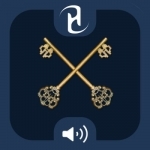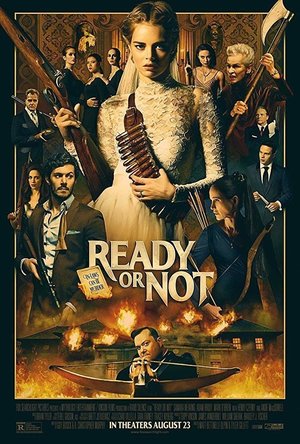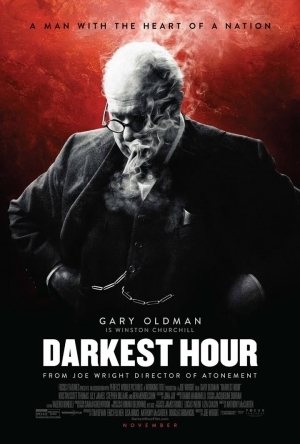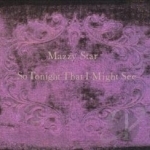Emma @ The Movies (1786 KP) rated Ready or Not (2019) in Movies
Nov 5, 2019
What stopped me in my tracks a little was what the film was trying to be. I thought it was going to be a homedy (yes I'm still trying to make my horror-comedy hybrid work), your traditional crazy horror with a comedic leaning... but what happened was a lot of drama, they were actually trying to be serious. Well, as serious as you can get when you're in the middle of hunting a bride on her wedding night. When mother and son sit to have a heart to heart I was actually taken out of the film for a moment as it wasn't in keeping with what else was happening.
Had this gone all the way over to crazy horror I would have given it a higher rating, they're fast paced and entertaining, the slight indecisiveness of what came to the screen really knocked it down for me. Even with the bizarre magic box tradition this film could have been something more serious but not by the time we get to that ending.
I'm really thankful that this game adaptation was at least better than Truth Or Dare. I don't think I could stand another stinker like that. The story is a nice easy one to get along with, family acquire a magic box that keeps them thriving and all they have to do is occasionally sacrifice someone that's loved deeply by one of the family... good old Satan bringing us a solid storyline.
Samara Weaving, or as I have to keep reminding myself "not Margot Robbie", plays our blushing bride, Grace. Boy does she throw a lot at this role, I like to think she got a lot of stress relief out of this as she fights back at her would be murderers. Thankfully Grace didn't end up in many of the drama-y bits so there was little to be annoyed about. Her magic moments included punching Georgie, swearing at the car and wailing like a banshee at the end like she'd gone feral. Bravo! But I think the best and worst bit was when she climbed out of hell, you knew what she was thinking, you knew she had no option and oh my god did I hurt in sympathy.
Adam Brody has to be the other stand out performance for me as the brother-in-law, Daniel Le Domas. We get a very small introduction to his character as a child but it really did help you to understand the way he is and why he reacts the way he does as they hunt Grace. The guilt he has from the first Hide & Seek he participated in is clearly part of the reason he's the son who's off the rails, but he keeps his protective nature from his childhood in adulthood towards his brother and Grace. He stops and talks with Grace during the hunt and you can see him switching allegiances as we get further through the story. Brody conveys this well and is actually the one character that you can sort of sympathise with. His death is the beginning of the end and it's an emotional moment that played out well on screen. I think he probably came out better not surviving to the end of the film.
There are lots of highs and lows with various characters throughout. Fitch is the "dumb" one and there was something magical about seeing him YouTubing how to use a crossbow and later asking Charity at what point they should cut and run.
Mark O'Brien as Alex Le Domas was probably my least favourite character. His scripting felt rather bland compared to some of the others... but mainly... what an arsehole! Just live in sin man! Why potentially doom her, I'm sure it wouldn't have been too hard to fall off the radar somehow. If he was already slightly estranged I can't see that going altogether would be much of a stretch.
Alex also gets what is possibly the most annoying part of the script, he's handcuffed to the bed and he starts using the chain as a saw to try to get through the ornamental bar... these aren't bit of Ikea furniture... in what universe is that going to work in this timeframe?! Stand up and throw your weight on it until it snaps! I was wondering if he was actually trying to break the handcuffs (an equally stupid idea), and do we actually see how he gets out of them? Now I've confused myself.
Anyway, this will become an epic if I don't move on.
I quite liked the way the film looked, once we got to the evening the whole set became a beautiful golden autumnal palette and it gave you a sense of wealth and history, but when you add in the blood and seeking you get a real sense of the hiding (that makes sense in my head). It did at times become dark, it was never so bad that you couldn't see what was happening but it allowed for the reintroduction of light at the end as the house burns behind her which was a nice touch.
The final sequence should probably get its own mention. Alex, obviously about to break after seeing his brother die and Grace bludgeoning his mother, is bizarrely confirming his fears that the pair will not be together after what has happened. He then turns on her so he can get back the only thing left in his life, his (now slightly smaller) family. I loved the slightly vampiric turn the scene took as they're exposed to the morning sun, I'm not sure I'd have recoiled from it quite so much but I appreciated the comedic value it added. The family's actual demise and Grace's ghost sighting are the reason this needed to be a homedy (Still no? Whatever.), there's no way that fits in with anything more serious. And I'm sorry but overall I didn't find it that funny, much like Last Blood I was reacting to the ridiculous violence.
I like to think that as the last bit of the house disintegrates in the fire and Grace is still sitting bleeding on the steps that a firefighter comes over with the seemingly untouched magic box and hands it to her because it looks like a family heirloom. She's a Le Domas now, and everything is hers...
Full review originally posted on: https://emmaatthemovies.blogspot.com/2019/11/ready-or-not-spoilers-movie-review.html
Bob Mann (459 KP) rated Darkest Hour (2017) in Movies
Sep 29, 2021
It’s 1940 and Western Europe is under siege. Neville Chamberlain (Ronald Pickup, “The Second Best Exotic Marigold Hotel“) is the Conservative Prime Minister but is voted out of office in an attempt to form a grand coalition government with Labour leader Clement Atlee (David Schofield). Despite appearing a shoe-in for the role, Viscount Halifax (Stephen Dillane) turns it down, thinking that his alternative (and bête noire) would drink from the poisoned chalice and be quickly be out of his (and Chamberlain’s) hair. For that alternative choice is the volatile and unpredictable Churchill (Gary Oldman), grudgingly invited into the job by King George VI (Ben Mendelsohn, “Rogue One“). With the Nazi’s bearing down on the 300,000 encircled troops at Dunkirk, and with calls from his war cabinet to capitulate and seek terms of settlement, this is indeed both Churchill’s, and the country’s, ‘darkest hour’.
Despite the woeful lack of historical knowledge among today’s youngsters, most will be at least aware of the story of Dunkirk, with many having absorbed Christopher Nolan’s film of last summer. This film is almost the matching bookend to that film, showing the terrifying behind-closed-door events that led up to that miracle. For it was terrifying seeing how close Britain came to the brink, and I’m not sure even I really appreciated that before. While this might have been a “thriller” if it had been a fictional story, we well know the outcome of the story: but even with this knowledge I still found the film to be extremely tense and claustrophobic as the net draws in around Churchill’s firmly-held beliefs.
Gary Oldman’s performance is extraordinary, and his award nominations are well-deserved. We have grown so used to some of his more over-the-top Russian portrayals in films like “Air Force One” and last year’s (pretty poor) “The Hitman’s Bodyguard” that it is easy to forget what a nuanced and flexible actor he is. Ever since that “No, surely not!” moment of that first glimpse of the film’s trailer, it has almost been impossible to ‘see’ Oldman behind the brilliant make-up of the character (Kazuhiro Tsuji gets a special credit for it). But his eyes are in there, and there are some extreme close-ups (for example, during a bizarre and tense phone call with Roosevelt (David Strathairn)) when you suddenly see “There you are!”.
The supportive wife – Clemmie (Kristin Scott Thomas) gives Winston (Gary Oldman) a hug.
While I have nothing against Brian Cox as an actor, I far prefer the portrayal of Churchill on show here compared to last year’s “Churchill“: true that that film was set three or four stressful years later, but Cox’s Churchill was portrayed as an incompetent fool, an embarrassment to the establishment that have to work around him. Oldman’s Churchill is irascible, unreasonable, but undeniably a leader and a great orator.
Mirroring “Churchill” though, the action is seen through the eyes of Churchill’s put-upon secretary, here played delightfully by Lily James (“Downton Abbey”, “Baby Driver“) who perfectly looks and sounds the part. The character is more successful than that of Ella Purnell’s Garrett in that she is given more room to develop her character and for the audience to warm to her. Oldman is getting all the kudos, but Lily James really deserves some for her touching and engaging performance here.
Perfectly cast: Lily James as Churchill’s secretary Elizabeth Layton.
Also in Oldman’s shadow is the always marvelous Kristin Scott Thomas (“Four Weddings and a Funeral”, “The English Patient”) as Clemmie Churchill, expressing all the love and frustration associated with being a long-suffering wife to an over-worked husband in the public service.
At the pen is “The Theory of Everything” writer Anthony McCarten, and I’d like to say its a great script but with most of the best lines (“a sheep in sheep’s clothing” – LoL) coming from Winston himself it’s difficult to tell. Some of the scenes can get a bit laborious and at 125 minutes – though not long by any means – the script could still perhaps have had a nip and tuck here and there.
Where some of this time is well spent though is in some sedate shots of London street life, across two separate scenes panning across everyday folk as the stresses of war start to become more evident. This is just one of the areas where director Joe Wright (“Atonement”, “Pride and Prejudice”) shows considerable panache, ably assisted by the cinematography of Bruno Delbonnel (“Inside Llewyn Davis“): a boy closes his telescope-fingers around Churchill’s plane; a bomb’s eye-view of the beleaguered Brigadier Nicholson in Calais; and – very impressively – the smoky imperiousness of the House of Commons set.
An atmospheric chamber: the recreation of the wartime House of Commons is spectacular (with production design by Sarah Greenwood (“Anna Karenina”, “Atonement”)).
And most-importantly Wright delivers what Christopher Nolan couldn’t deliver in “Dunkirk“: a properly CGI’d vista of hundred of small boats crossing the channel to Dunkirk. Now THAT is a scene that Kenneth Branagh could justly have looked in awe at!!!
There are a number of scenes that require disbelief to be suspended though: the biggest one being a tube train ride – very moving and effective I must say – but one that features the longest journey between any two stations on the District Line than has ever been experienced!
One stop on the District Line via Westminster…. via Harrow-on-the-Hill!
So this is a great film for really reliving a knife-edge moment in British history, and is highly recommended particularly for older viewers. If I’m honest though, between “Darkest Hour”, “Churchill” and John Lithgow’s excellent portrayal in “The Crown” I’m all over portrayals of the great man for a few years. Can we please move on now Hollywood?

Death By Rock and Roll by The Pretty Reckless
Album
Rock 'n' roll is a religion. It's a commitment to an ideal, a belief system. The lifestyle and...
Faris Badwan recommended track Bells Ring by Mazzy Star in So Tonight That I Might See by Mazzy Star in Music (curated)

Quit For Health
Health & Fitness
App
Quit For Health is a motivational app to help those looking to quit or stay clean of smoking, soda,...

The Master Key System by Charles Haanel Audiobook Meditation Program: A Better Personality, Power to Achieve, Personal Purpose, Derived From -The Secret, From Mind Cures.
Book and Business
App
**Bonus FREE Master Key System eBook with this app** **24-Audios for over 6 hours of listening!** ...

5K Runmeter Run Walk Training
Health & Fitness and Lifestyle
App
Train to run your very first 5K race, and then continue with the award-winning Runmeter GPS...

Runmeter Running & Cycling GPS
Health & Fitness and Sports
App
Runmeter is the most advanced application for runners ever designed for a mobile device. Built from...

Aqua Map South Africa HD Pro - GPS Nautical Charts
Navigation and Travel
App
*** New exclusive function: mapXpan *** An app to satisfy all your Fishing and Boating's needs,...

Aqua Map Americas - Marine GPS
Navigation and Travel
App
An app to satisfy all your Fishing and Boating's needs, developed with the help of professional...


